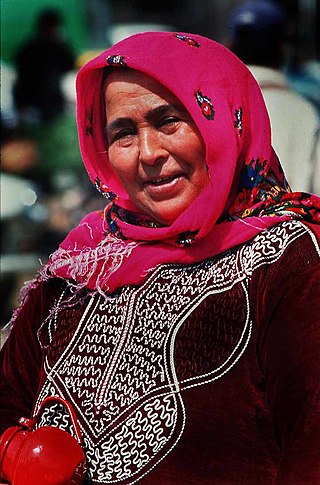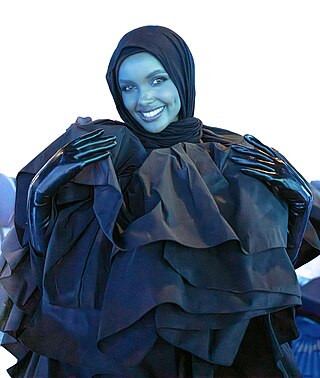Related Research Articles

In modern usage, hijab generally refers to various headcoverings worn by Muslim women. While a hijab can come in many forms, it often specifically refers to a headscarf, wrapped around the head and neck, covering the hair, neck, and ears but leaving the face visible. The use of the hijab has been on the rise worldwide since the 1970s and is viewed by many Muslims as expressing modesty and faith. There is a consensus among Islamic religious scholars that covering the head is either required or preferred, though some Muslim scholars and activists argue that it is not required. In practice, most Muslim women choose to wear it.

Women's basketball is the team sport of basketball played by women. It began being played in 1892, one year after men's basketball, at Smith College in Massachusetts. It spread across the United States, in large part via women's college competitions, and has since spread globally. As of 2020, basketball is one of the most popular and fastest growing sports in the world.
Islamic clothing is clothing that is interpreted as being in accordance with the teachings of Islam. Muslims wear a wide variety of clothing, which is influenced not only by religious considerations, but also by practical, cultural, social, and political factors. In modern times, some Muslims have adopted clothing based on Western traditions, while others wear modern forms of traditional Muslim dress, which over the centuries has typically included long, flowing garments. Besides its practical advantages in the climate of the Middle East, loose-fitting clothing is also generally regarded as conforming to Islamic teachings, which stipulate that body areas which are sexual in nature must be hidden from public view. Traditional dress for Muslim men has typically covered at least the head and the area between the waist and the knees, while women's islamic dress is to conceal the hair and the body from the ankles to the neck. Some Muslim women also cover their face. However, other Muslims believe that the Quran does not mandate that women need to wear a hijab or a burqa.

The intimate parts of the human body must, according to Islam, be covered by clothing. Exposing the intimate parts of the body is unlawful in Islam as the Quran instructs the covering of male and female genitals, and for adult females the breasts. Exposing them is normally considered sinful. Exposing intimate parts when needed, such as going to the toilet or bathing, falls under a specific set of rules. Precisely which body parts must be covered varies among different schools of Islamic thought.
Islamic feminism is a form of feminism concerned with the role of women in Islam. It aims for the full equality of all Muslims, regardless of gender, in public and private life. Islamic feminists advocate women's rights, gender equality, and social justice grounded in an Islamic framework. Although rooted in Islam, the movement's pioneers have also utilized secular, Western, or otherwise non-Muslim feminist discourses, and have recognized the role of Islamic feminism as part of an integrated global feminist movement.

Merve Safa Kavakcı is a Turkish politician, who was elected as a Virtue Party deputy for Istanbul on 18 April 1999. She served as the Turkish ambassador to Malaysia from 2017 but was recalled to Ankara following the appointment of Emir Salim Yüksel as the Turkish Ambassador to Malaysia in June 2022.

In modern usage, ḥijāb (hijab) generally refers to the various headcoverings frequently worn by Muslim women. Wearing hijab is mandatory in some Muslim countries, and optional or restricted in other majority Muslim and majority non-Muslim countries. In the Indonesian Aceh province, Muslim women are required to wear the hijab and all women are required to do so regardless of religion in Iran and Afghanistan. In countries such as Saudi Arabia, the hijab is not required. Meanwhile, in Gaza, Palestinian school officials have voted to require young girls to wear hijab, while Palestinian jihadists belonging to the Unified Leadership (UNLU) have rejected a hijab policy for women. They have also targeted those who seek to impose the hijab.

Sara Blicavs is an Australian professional basketball player. She currently plays for the Southside Flyers in the WNBL

Cayla George is an Australian professional basketball player for the Las Vegas Aces of the Women's National Basketball Association (WNBA). She was a member of the Australian Women's basketball team (Opals) at the 2020 Tokyo Olympics. The Opals were eliminated after losing to the USA in the quarterfinals.
Ruqsana Begum is an English professional kickboxer and boxer. She was a British and World Kickboxing Association female Atomweight (48–50 kg) Muay Thai boxing champion and captain of the British Muay Thai Team. In March 2018, Begum made the switch from professional kickboxing to boxing.
Bilqis Abdul-Qaadir is an American former collegiate basketball player. She was notable for playing basketball while wearing a hijab, a headscarf for Muslim women.

Modern Muslim female athletes have achieved success in a variety of sports, including volleyball, tennis, association football, fencing, and basketball. In the 2016 Summer Olympics, fourteen women from Muslim-majority countries won medals, participating in a wide range of sports.

Halima Aden is a Somali and American fashion model. She is noted for being the first woman to wear a hijab in the Miss Minnesota USA pageant, where she was a semi-finalist. Following her participation in the pageant, Halima received national attention and was signed to IMG Models. She was also the first model to wear a hijab and burkini in the Sports Illustrated Swimsuit Issue.
The United States House of Representatives ban on head covering is an 1837 simple resolution that is a sumptuary rule restricting Representatives from wearing any headgear during sessions. It originally represented a break from the British House of Commons hat-wearing tradition. After 181 years, in 2018 a partial repeal to allow religious accommodation for a number of faiths that practice head covering was proposed with the election of Ilhan Omar, who wears a hijab.
Suhaiymah Manzoor-Khan is a British spoken word poet, writer and speaker, known for her poem "This Is Not a Humanising Poem" and writing about life as a Muslim woman in England on her site, The Brown Hijabi.

The 2021 European Women Basketball Championship, commonly called EuroBasket Women 2021, was the 38th edition of the continental tournament in women's basketball, sanctioned by the FIBA Europe. It was co-hosted by France and Spain between 17 and 27 June 2021. It was the third time to be hosted by multiple countries. The tournament also served as part of European qualification for the 2022 FIBA Women's Basketball World Cup, with the top six nations advancing to the qualifying tournaments. The final were planned to be held at the AccorHotels Arena in Paris but moved to the Pavelló Municipal Font de San Lluís, in Valencia.

Islamic feminist views on dress codes include views on issues surrounding women's dress codes in Islam, especially on the hijab and niqāb.

Hawa Cissoko is a French professional footballer who plays as a defender for English FA Women's Super League club West Ham United and the France national team. She also holds Malian citizenship.

Amal Kassir is an American international award winning spoken word poet.
At the beginning of February 2022, a dispute pertaining to school uniforms was reported in the Indian state of Karnataka, when some Muslim students of a junior college who wanted to wear hijab to classes were denied entry on the grounds that it was a violation of the college's uniform policy which was also followed by the other religion students as well. Over the following weeks, the dispute spread to other schools and colleges across the state, with groups of Hindu students staging counter-protests by demanding to wear saffron scarves. On 5 February, the Karnataka government issued an order stating that uniforms must be worn compulsorily where policies exist and no exception can be made for the wearing of the hijab. Several educational institutions cited this order and denied entry to Muslim girls wearing the hijab.
References
- 1 2 3 "The hijabi basketballer who changed the rules". BBC News. Retrieved 2020-02-18.
- 1 2 3 "Spoken Word Poet Asma Elbadawi Has A Complicated Relationship With The Feminine & Masculine". Bustle. Retrieved 2020-02-18.
- 1 2 "Basketball and the hijab – Asma Elbadawi interview". Channel 4 News. Retrieved 2020-02-18.
- 1 2 "Asma Elbadawi". Freedom Studios. Retrieved 2020-02-18.
- 1 2 "'Sport lives in all of us' - Women's Sport Week poem". BBC Sport. 2017-06-23. Retrieved 2020-02-18.
- 1 2 "Meet Asma Elbadawi – She Eliminated the Hijab Ban in Professional Basketball and Won the Rising Star in Sports Award". Mvslim. 2019-03-07. Retrieved 2020-02-18.
- ↑ "Basketball governing body changes rules to allow hijab". The Muslim News. Retrieved 2020-02-18.
- ↑ "Asma Elbadawi Eliminates the Hijab Ban In Professional Basketball". Scoop Empire. 2019-03-17. Retrieved 2020-02-18.